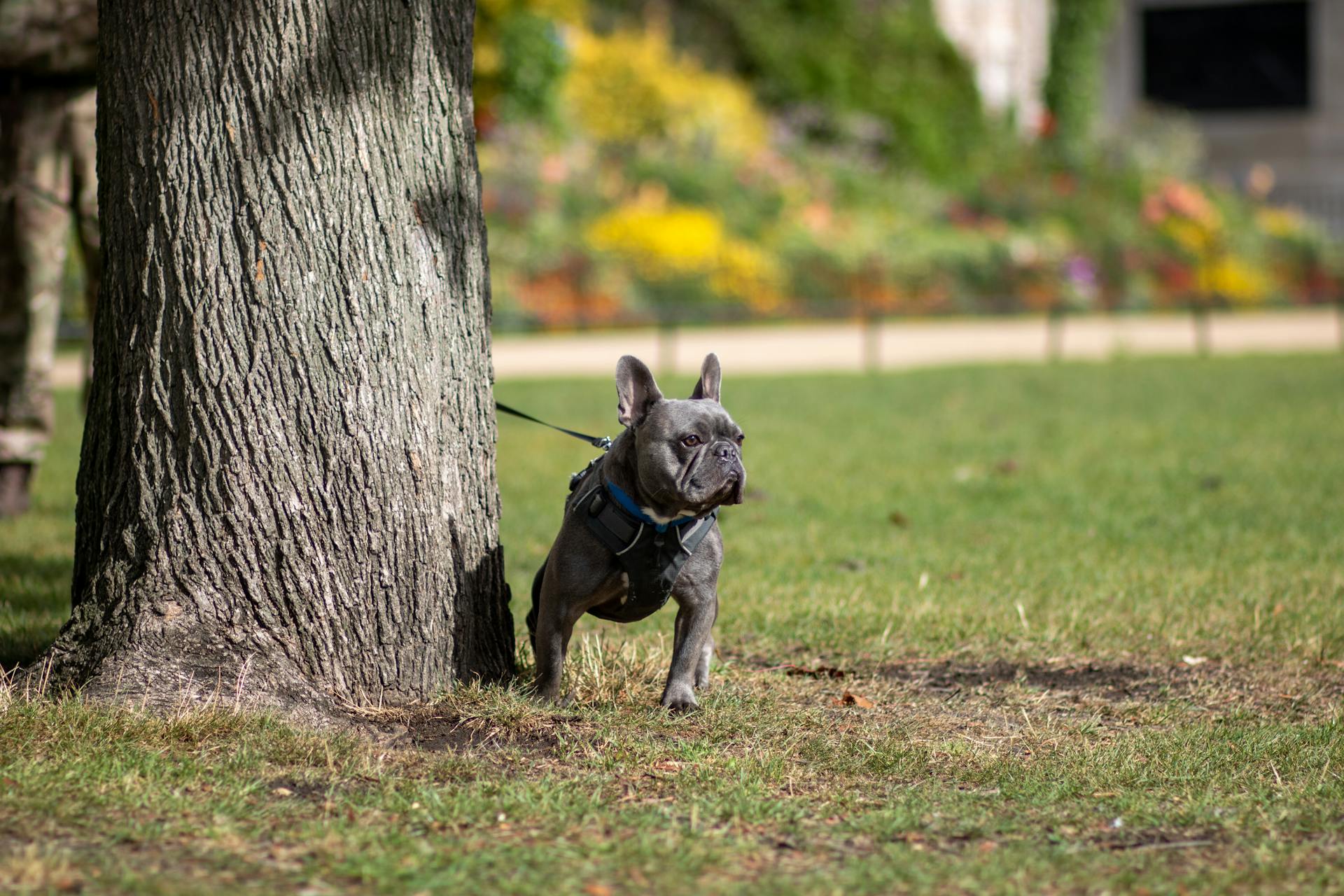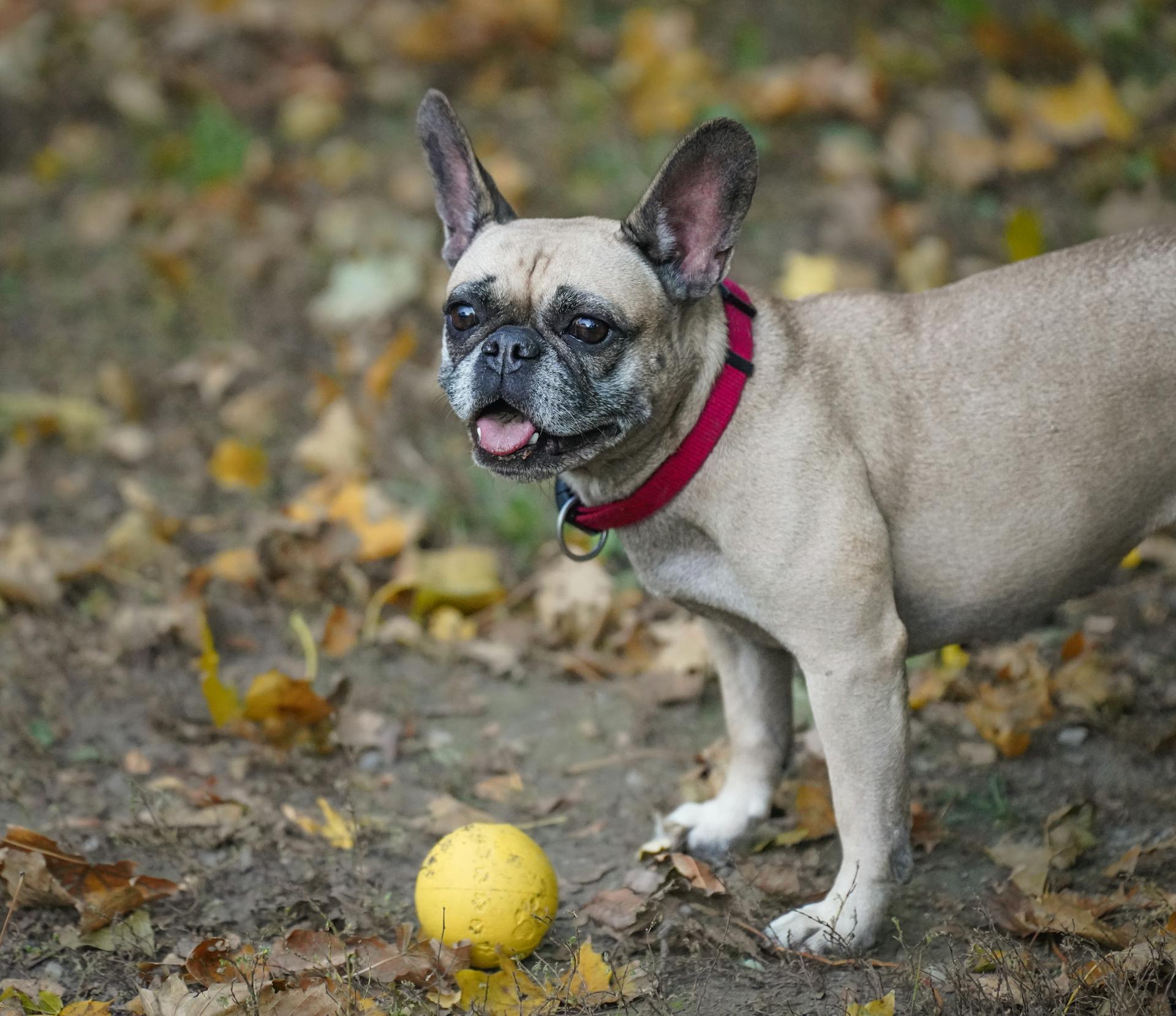
French Bulldogs can be a bit finicky when it comes to their diet, but eggs can be a great addition to their meals.
Eggs are a nutrient-rich food that can provide essential protein, vitamins, and minerals for your French Bulldog.
However, it's essential to introduce eggs gradually and in moderation to prevent digestive issues.
French Bulldogs have a sensitive stomach, so it's crucial to monitor their egg consumption and adjust as needed.
Boiled
Boiled eggs are a great option for French Bulldogs, as they're safe and don't pose any risk of oil or seasonings being leftover on pans.
Just be sure to let the boiled egg cool off before cutting it into smaller pieces to prevent choking.
You can feed your French Bulldog boiled eggs as a treat or add them to their regular meals for a nutritious boost.
Boiled eggs are a convenient and healthy snack for French Bulldogs, making them a great choice for pet owners who want to give their dogs a tasty and safe treat.
Take a look at this: Ferrets Eat Boiled Eggs
Hard-Boiled
Hard-boiled eggs are a healthy and tasty treat for French Bulldogs as long as you pay attention to portion sizes. A boiled egg can also be helpful in settling your dog's tummy after an upset.
Boiling eggs removes the temptation to add additional fats like oil or butter during preparation, making them safe for French Bulldogs to consume.
Hard-boiled eggs are safe for dogs to eat because boiling will rid the eggs of any harmful bacteria.
Egg Safety and Risks
Raw or undercooked eggs can contain Salmonella bacteria, which can cause food poisoning in dogs.
The risk of Salmonella is higher in eggs that are not stored properly.
Salmonella can be killed by cooking eggs thoroughly.
According to the USDA, eggs should be cooked to an internal temperature of at least 160°F (71°C) to ensure food safety.
French Bulldogs are more prone to food allergies and sensitivities, which may be triggered by eggs.
Some dogs can develop an allergy to eggs as they age.
If your French Bulldog shows signs of an egg allergy, such as itchy skin or digestive issues, it's best to consult with a veterinarian for proper diagnosis and treatment.
Feeding Your Dog Eggs

Feeding your French Bulldog eggs can be a nutritious and tasty addition to their diet. However, it's essential to do it safely and in moderation.
You can feed your French Bulldog eggs in various ways, including hard-boiled, soft-boiled, poached, or scrambled, as long as no added salt or seasonings are used. Cooking eggs is recommended to prevent bacterial infections like Salmonella.
Start with a small amount, such as half an egg, and gradually increase the serving size based on your dog's size and reaction. For example, dogs weighing 40 pounds or more can handle a whole egg, while smaller dogs should have proportionately less.
Here's a rough guide to serving eggs to your French Bulldog:
Remember to always check with your veterinarian before offering eggs to your pet, especially if they have any health issues or allergies.
Are Good?
Feeding your dog eggs can be a nutritious and delicious addition to their diet. However, it's essential to do it safely and responsibly.

Raw eggs are not advised for dogs as they pose a number of potential health risks. Raw eggs may contain E. coli and Salmonella, bacteria that can make your pup very sick.
Cooked eggs are a much safer option for your dog. They're high in protein, fats, and vitamins that will benefit your dog immensely.
But can eggs be bad for dogs? Yes, they can. In rare instances, eggs can cause an allergy, particularly to the egg white. If your dog is allergic to eggs, you may notice symptoms like vomiting and diarrhea.
It's also worth noting that feeding your dog raw eggs doesn't have any nutritional benefits over cooked eggs at all. So, it's best to stick with cooked eggs.
Expand your knowledge: Cooked Food Diet for Dogs
How to Safely Give Your Dog Eggs
Feeding your dog eggs can be a nutritious addition to their diet, but it's essential to do it safely. Cooked eggs are a much safer option than raw eggs, which can transfer harmful bacteria to your dog.

To hard-boil eggs, simply place them in a pan of water and cook them until the yolks are set. Add the chopped eggs to your dog's regular food without any added salt or seasonings. You can also serve poached eggs or scrambled eggs, but be sure to leave out the butter or salt.
One or two eggs per week is considered a safe amount for most dogs, depending on their size and breed. Smaller dogs can have one egg, while bigger dogs can have two. However, feeding eggs to your dog every day is not recommended due to their high fat content.
Here's a rough guide to help you determine how many eggs to feed your dog:
Remember to always check with your veterinarian before offering eggs to your pet, especially if they have a history of allergies or health issues. And don't forget to store your eggs properly to prevent the growth of harmful bacteria.
By following these simple guidelines, you can safely give your dog eggs as a tasty and nutritious snack. Just be sure to monitor your dog's reaction to eggs and adjust the amount accordingly.
Can French Bulldogs Eat Eggs?
French Bulldogs can safely eat eggs in moderation, but it's essential to introduce them gradually to prevent digestive upset.
Eggs are a nutrient-rich food that can provide essential protein and vitamins for French Bulldogs.
However, French Bulldogs are prone to food allergies and sensitivities, which may be triggered by eggs.
Some French Bulldogs may also experience gastrointestinal issues if they eat too many eggs.
If you decide to feed your French Bulldog eggs, choose eggs that are rich in omega-3 fatty acids to support their skin and coat health.
Eggshells
Eggshells are a great source of calcium for French Bulldogs, but it's essential to use them in moderation to avoid an imbalance. They contain approximately 2,000 mg of elemental calcium per shell, which can meet the daily needs of an 85-pound dog.
To ensure your French Bulldog gets the right amount of calcium, it's crucial to calculate the correct amount based on their individual needs. You can find a calculator in the article "Calcium in Homemade Dog Food", WDJ May 2019.

Eggshells should never be added to the diet of French Bulldogs already eating a nutritionally complete commercial diet, as they'll end up receiving far too much calcium. This can be particularly problematic for large-breed puppies, who need to be careful not to overdo it on the calcium during the first six months.
Ground eggshell powder is the safest way to provide calcium, as it eliminates the risk of harming your French Bulldog's mouth, throat, and stomach. Simply grind the shells in a clean coffee grinder or blender.
While eggshells are safe for French Bulldogs to eat, it's essential to be cautious and only give them in moderation to prevent an overload of calcium. Unless you're making your dog's meals at home and consulting with a veterinarian, it's best to err on the side of caution and avoid giving eggshells altogether.
Frequently Asked Questions
How many eggs can a French Bulldog eat per day?
For a French Bulldog, a daily egg limit is one full egg, and eggs should not be the sole source of protein in their diet.
How do you cook eggs for a French Bulldog?
For a French Bulldog, cook eggs by boiling or poaching them to remove oils, salt, and spices. This safe preparation method helps prevent gastrointestinal issues.
Featured Images: pexels.com


